Last week BBC updated its backgrounder on China and Taiwan, entitled “What’s behind the China-Taiwan Divide?” BBC’s backgrounders on Taiwan have been (cough, cough) very creative, and this latest iteration, while an improvement over the earlier versions, is a proud torch-bearer for that tradition.
The BBC begins by observing that “Austronesian tribal people” were the first people in Taiwan. What does the use of the word “tribal” suggest about those people, compared to the Chinese?
After that, the Aborigines disappear from the story. Because they have the earliest and strongest claim to Taiwan? To keep them in view would of course expose the deep racism of China’s claims to Taiwan.
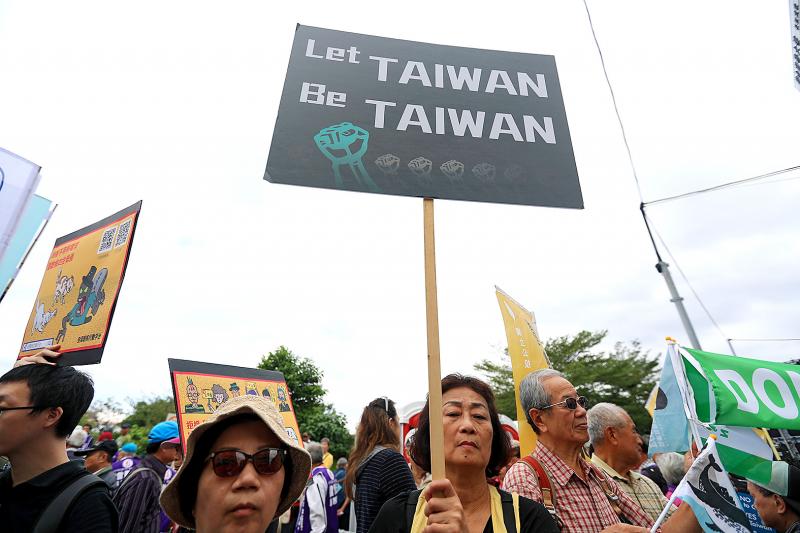
Photo: EPA-EFE
TELLING OMISSIONS
BBC’s creative interpretations of Taiwan history then commence. It avers that the island first appears in Chinese records in 239 CE, and says “China” sent an expedition to explore the area, which BBC asserts is a “fact”. There was no “China” then — the men were sent out by the Kingdom of Wu.
It is quite true that a third century text, the “Book of Wu” (吳書) in the Records of the Three Kingdoms (三國志) says that Emperor Sun Quan (孫權) of Wu commanded two generals to find Yizhou (夷洲) around 230 CE. The text contains a few lines lacking any details to identify where or what Yizhou is.
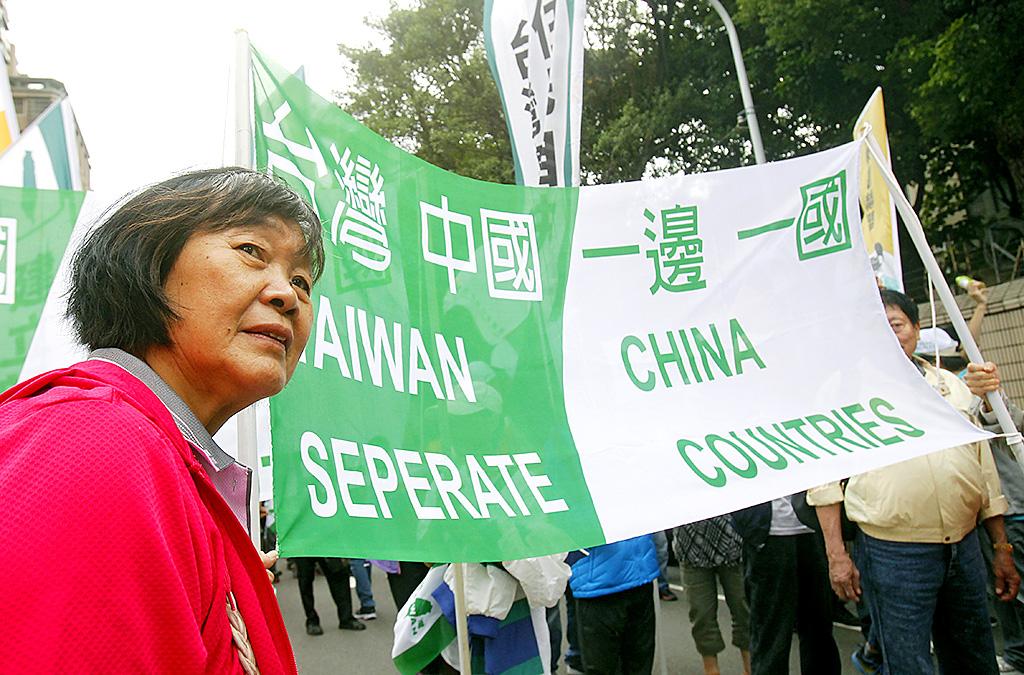
Photo: AP
In a Song Dynasty text, centuries later, there is a lengthy description of the habits of the Yizhou people, but again, there is nothing that specifically relates to Taiwan. It could well be discussing any number of peoples of the coastal islands off what is now China. Since the ancient Chinese were not deep-water sailors but coast huggers, it is highly unlikely that Sun’s subordinates ever made it to Taiwan (consider also that crossing the Taiwan Strait was dangerous and required good working knowledge of the currents and winds). The text locates Yizhou to the southeast of Wu, but Taiwan lies nearly due south of the kingdom. Okinawa, however, is in the right location.
BBC says this nugget of CCP expansionist propaganda is a “fact.”
When I teach or write on the media, I often say that the hardest thing to see in any text is what is not there. BBC’s omissions are telling.
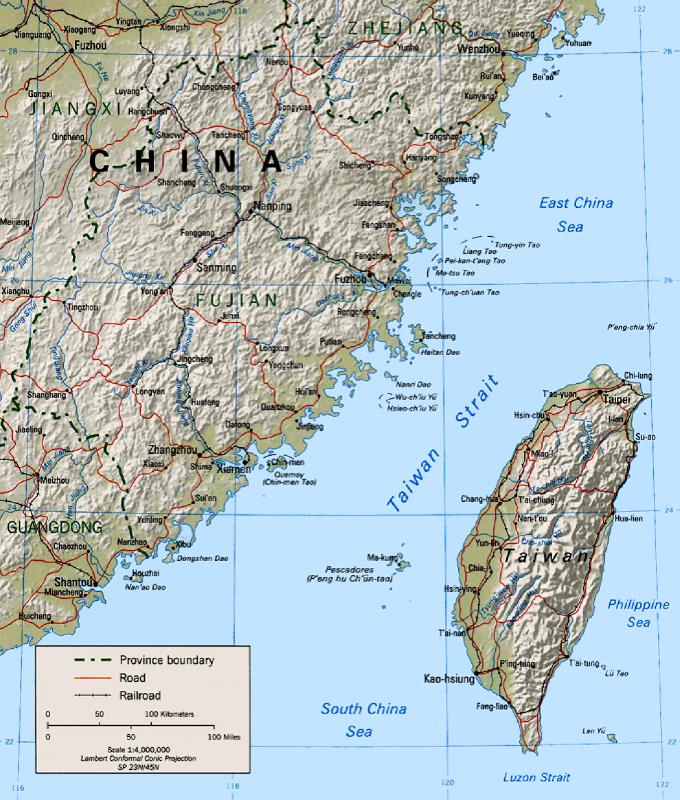
Photo courtesy of Wikimedia Commons
Despite their formative, profound effects on China-Taiwan relations, the 228 Incident, Martial Law and White Terror are gone. BBC still uses the softening phrase “dominated Taiwan’s politics” to refer to Chinese Nationalist Party (KMT) rule at gunpoint. The backgrounder now mentions authoritarian rule and resistance to it, but it fails to discuss the impact of colonial Chinese rule on Taiwan’s relations with China and the attitude of the Taiwanese toward China.
Also gone is mention of Taiwan’s legal status. Note that BBC uses the phraseology “Japan … relinquished control of territory it had taken from China” implying that the writer knows very well that sovereignty over Taiwan was not awarded to China, but BBC omits that. It thus omits any mention that Taiwan’s status under international law remains undecided, a position which happens to be UK government policy.
Another telling omission: the BBC discusses some of the developments of the 1990s but there is no mention of President Lee Teng-hui (李登輝), whose ushering in of Taiwan’s democracy also disappears. Instead, it attributes democratization to Chiang Ching-kuo (蔣經國) after pressure from the resistance to KMT rule. Lee, of course, is detested in pro-China, pro-KMT circles.
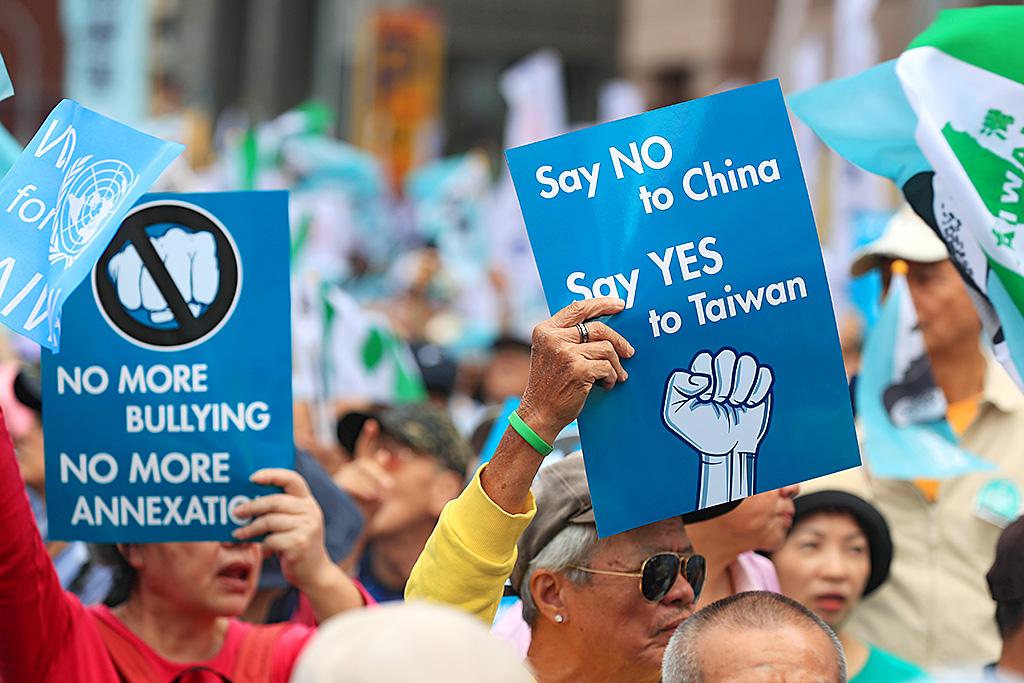
Photo: EPA-EFE
At least BBC mentions President Chen Shui-bian (陳水扁), who “alarmed” Beijing. What was his effect on people in Taiwan and their attitudes toward Taiwan’s status and toward China? Apparently BBC doesn’t know.
Moreover, out of the thousands of possible images of Chen, the BBC has chosen one in which Chen sports a giant zit on his nose, right in the center of the image.
In the best blame-the-victim style, BBC then says Chen’s reelection triggered the passage of Beijing’s “Anti-Secession” Law, which it describes as “stating China’s right to use ‘non-peaceful means’ against Taiwan.” China has no “right” to maim and murder Taiwanese and annex their island, nor could any law ever give it that right. The “Anti-Secession” Law is a declaration of intent only.
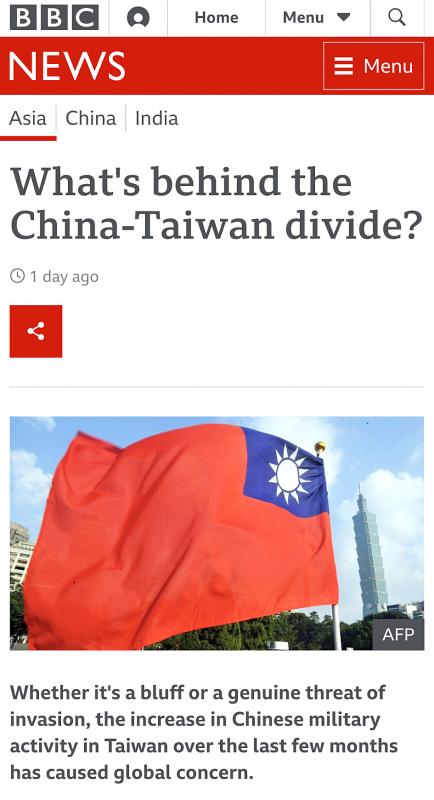
Screenshot
BBC would never scribe: “Nazi Germany’s security laws gave it the right to execute Jews” or “Russia’s laws give it the right to invade Estonia and Latvia.”
It would be instantly obvious how vile that thought is. Sadly, because major media organs continue to avoid forthright presentation of Taiwan’s international status and often frame the discussion as one of “rights,” they help legitimate China’s threats of violence against the people of Taiwan.
OUTRIGHT ERRORS
Along with the omissions, there are a couple of outright errors. BBC asserts “the US has an agreement to supply Taiwan with defensive weapons,” though no such agreement exists. BBC appears to be referring to the Taiwan Relations Act, an internal law of the US (not an agreement with Taiwan, which has no formal role in the act) which strongly encourages, though does not compel, the US to supply Taiwan with weapons.
One of the fascinating things about this backgrounder is that the reader is left without any clear knowledge of Taiwan’s status. Whenever BBC appears about to offer that information, it shies away, and ends its discussion by saying that Taiwan’s legal status is unclear. It is actually quite clear under international law, but BBC somehow fails to tell the reader. Why? Instead, it uses false equivalence to present China as having one view and Taiwan as having another.
It goes without saying that the BBC does not situate the “China-Taiwan divide” against the background of China’s other expansionist claims. This approach, an important perspective for understanding Chinese aggression and Taiwanese resistance, is all too common in the media.
At the end, BBC also omits any mention of polls in Taiwan showing that when respondents are given the two choices of being annexed to China or becoming an independent state, they overwhelmingly choose independence.
Even the National Chengchi University (國立政治大學) poll that is widely cited to pretend that Taiwanese prefer the “middle ground” as BBC calls it, shows that as of last year, annexation to China has little support, and most of the public prefers a political state which keeps Taiwan from far from Chinese rule. Even in that poll over 30 percent of the public prefers independence at some point.
The BBC’s attitude appears to be signaled by the title chosen for the piece, with its mention of the China-Taiwan “divide” as if the two belonged together, an assumptive framing. Instead of “divide” the BBC could have used the more neutral “issue.” This assumptive posture colors the framing of the entire piece, in which BBC refers to independence “from” China, though Taiwan is not currently part of China (despite two Chinese governments claiming it is).
BBC heads its explanation of recognition of Taiwan by noting “There is disagreement and confusion about what Taiwan is.” That’s entirely correct, and sadly, a good chunk of the confusion and disagreement appears to reside within BBC’s editorial offices.
Notes from Central Taiwan is a column written by long-term resident Michael Turton, who provides incisive commentary informed by three decades of living in and writing about his adoptive country.

Jacques Poissant’s suffering stopped the day he asked his daughter if it would be “cowardly to ask to be helped to die.” The retired Canadian insurance adviser was 93, and “was wasting away” after a long battle with prostate cancer. “He no longer had any zest for life,” Josee Poissant said. Last year her mother made the same choice at 96 when she realized she would not be getting out of hospital. She died surrounded by her children and their partners listening to the music she loved. “She was at peace. She sang until she went to sleep.” Josee Poissant remembers it as a beautiful

March 2 to March 8 Gunfire rang out along the shore of the frontline island of Lieyu (烈嶼) on a foggy afternoon on March 7, 1987. By the time it was over, about 20 unarmed Vietnamese refugees — men, women, elderly and children — were dead. They were hastily buried, followed by decades of silence. Months later, opposition politicians and journalists tried to uncover what had happened, but conflicting accounts only deepened the confusion. One version suggested that government troops had mistakenly killed their own operatives attempting to return home from Vietnam. The military maintained that the

Before the last section of the round-the-island railway was electrified, one old blue train still chugged back and forth between Pingtung County’s Fangliao (枋寮) and Taitung (台東) stations once a day. It was so slow, was so hot (it had no air conditioning) and covered such a short distance, that the low fare still failed to attract many riders. This relic of the past was finally retired when the South Link Line was fully electrified on Dec. 23, 2020. A wave of nostalgia surrounded the termination of the Ordinary Train service, as these train carriages had been in use for decades

Lori Sepich smoked for years and sometimes skipped taking her blood pressure medicine. But she never thought she’d have a heart attack. The possibility “just wasn’t registering with me,” said the 64-year-old from Memphis, Tennessee, who suffered two of them 13 years apart. She’s far from alone. More than 60 million women in the US live with cardiovascular disease, which includes heart disease as well as stroke, heart failure and atrial fibrillation. And despite the myth that heart attacks mostly strike men, women are vulnerable too. Overall in the US, 1 in 5 women dies of cardiovascular disease each year, 37,000 of them